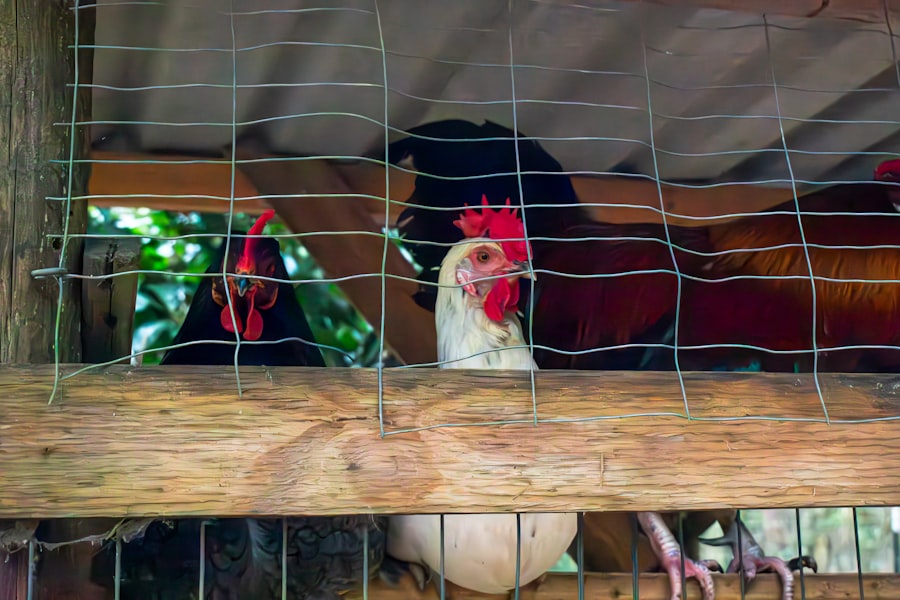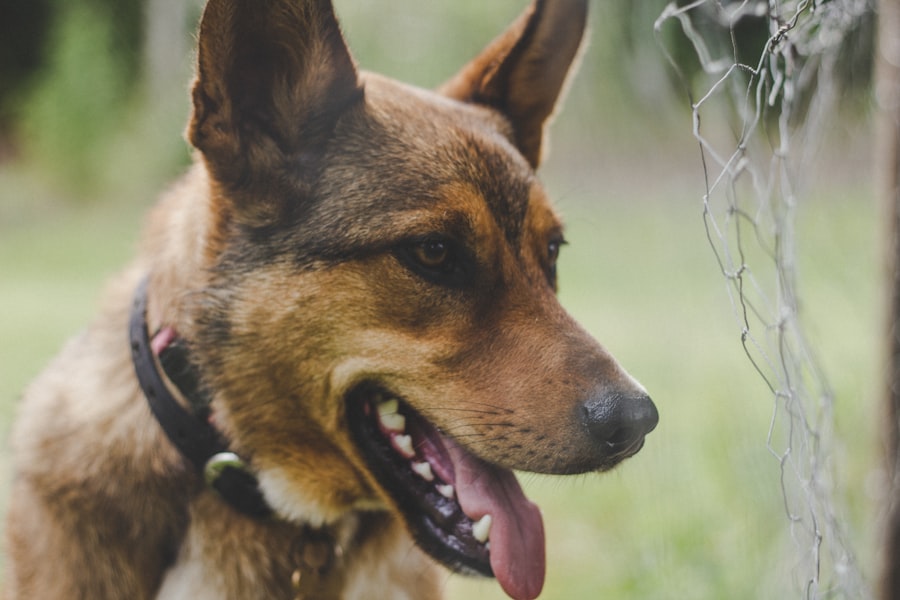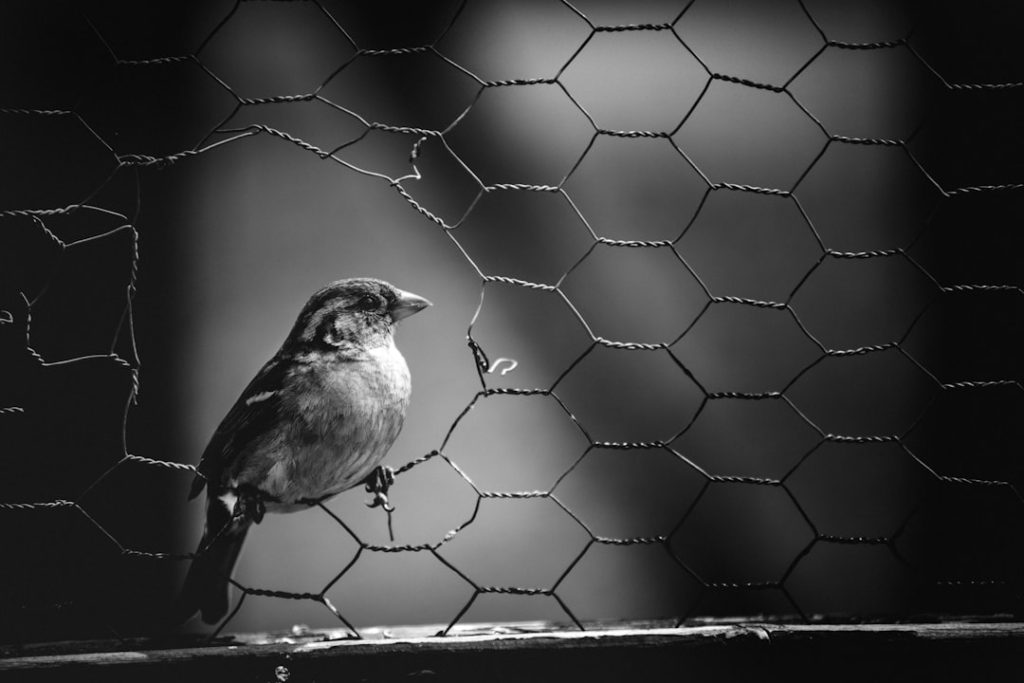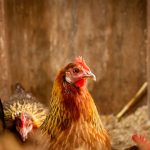Ensuring the safety and security of chickens is paramount for poultry owners. A robust fence serves multiple essential functions in chicken husbandry. Primarily, it acts as a protective barrier against predators such as foxes, raccoons, and raptors, which pose significant threats to poultry.
Chickens, being natural foragers, are vulnerable to these predators without adequate protection. A secure fence also defines the boundaries of the chickens’ living area, preventing them from wandering into potentially hazardous zones or becoming lost. This containment is crucial for their safety and well-being.
Moreover, it protects surrounding areas, such as gardens and flower beds, from damage caused by the chickens’ foraging behavior. The fence provides additional protection against other potential threats, including stray dogs or unfamiliar animals that might harm the chickens. By creating a defined and secure space, a well-constructed fence contributes significantly to the overall health, safety, and contentment of the flock.
It is an indispensable element in creating an environment where chickens can thrive under human care.
Table of Contents
- 1 Choosing the Right Type of Fence for Your Chicken Coop
- 2 Installing a Fence: Tips and Considerations
- 3 Maintaining Your Chicken Fence: Preventing Escapes and Predators
- 4 Enhancing the Fence with Additional Security Measures
- 5 Troubleshooting Common Issues with Chicken Fencing
- 6 Creating a Safe and Happy Environment for Your Chickens
- 7 FAQs
- 7.1 What is a chicken fence?
- 7.2 What are the benefits of using a chicken fence?
- 7.3 What are the different types of chicken fences available?
- 7.4 How high should a chicken fence be?
- 7.5 What materials are commonly used for chicken fences?
- 7.6 Are there any regulations or guidelines for installing a chicken fence?
Key Takeaways
- A secure fence is crucial for keeping chickens safe from predators and preventing escapes.
- When choosing a fence for your chicken coop, consider factors such as material, height, and visibility.
- When installing a fence, ensure it is buried underground to prevent digging predators and regularly inspect for any weak spots.
- Regular maintenance of the chicken fence is essential to prevent escapes and keep predators at bay.
- Additional security measures such as predator-proofing the coop and using electric fencing can further enhance the safety of your chickens.
Choosing the Right Type of Fence for Your Chicken Coop
Material Options
When selecting a fence for your chicken coop, the material is a crucial factor to consider. You have several options to choose from, including wire mesh, chain link, wood, and electric fencing. Each material has its advantages and disadvantages, so it’s essential to weigh these factors against your specific needs and budget.
Fence Height and Spacing
The height of the fence is another critical consideration. The ideal height will depend on the size and breed of your chickens, as well as the potential threats in your area. For example, if you have larger breeds or live in an area with a high population of predators, a taller fence may be necessary to provide adequate protection. Additionally, the spacing between the fence posts or mesh should be small enough to prevent predators from squeezing through or reaching in to grab a chicken.
Durability and Aesthetic Appeal
It’s also important to consider the overall durability and longevity of the fence material. Chickens can be quite destructive, so it’s essential to choose a fence that can withstand their pecking, scratching, and potential attempts to escape. Furthermore, consider the aesthetic appeal of the fence and how it will blend with the overall look of your property. By carefully considering these factors, you can choose the right type of fence that will provide the necessary security for your chicken coop.
Installing a Fence: Tips and Considerations

Installing a fence for your chicken coop requires careful planning and consideration to ensure that it is secure and effective. Before beginning the installation process, it’s important to survey the area and identify any potential hazards or weak points that may need to be addressed. This could include uneven terrain, existing structures, or vegetation that may need to be cleared.
When it comes to actually installing the fence, proper technique and attention to detail are crucial. Ensure that the fence is installed with sturdy posts that are securely anchored into the ground to prevent any potential sagging or leaning over time. Additionally, make sure that the fence is installed at an appropriate height and that there are no gaps or weak points that could compromise its security.
Consider adding additional security measures such as burying wire mesh underground to prevent digging predators from gaining access to the coop. It’s also important to install a secure gate that can be locked to prevent unauthorized entry. Finally, consider adding visual deterrents such as scarecrows or reflective tape to further discourage predators from approaching the coop.
By carefully considering these tips and considerations during the installation process, you can ensure that your chicken coop fence is secure and effective in protecting your flock.
Maintaining Your Chicken Fence: Preventing Escapes and Predators
Once your chicken fence is installed, it’s important to regularly maintain it to prevent escapes and keep predators at bay. Regularly inspect the fence for any signs of wear and tear, such as loose or damaged sections, and promptly repair any issues to maintain its security. Additionally, consider reinforcing weak points or areas where predators may attempt to gain access.
Regularly trimming vegetation around the fence can also help to prevent predators from using it as cover to approach the coop. Additionally, consider installing predator-proofing measures such as adding an apron of wire mesh around the perimeter of the coop to prevent digging predators from gaining access from below. Regularly monitoring your chickens for any signs of stress or injury can also help to identify potential issues with the fence.
If you notice any signs of distress or injury, it’s important to promptly investigate and address any potential breaches in the fence’s security. By regularly maintaining your chicken fence and taking proactive measures to prevent escapes and predator attacks, you can ensure that your chickens remain safe and secure in their environment.
Enhancing the Fence with Additional Security Measures
In addition to a secure fence, there are several additional security measures that can be implemented to further enhance the safety of your chicken coop. One effective measure is installing motion-activated lights or alarms around the perimeter of the coop to deter nocturnal predators such as raccoons or foxes. These lights or alarms can startle predators and discourage them from approaching the coop.
Another effective security measure is using guard animals such as dogs or geese to protect your chickens from predators. These animals can serve as an additional line of defense against potential threats and help to keep predators at bay. Additionally, consider using netting or wire mesh over the top of the chicken run to prevent aerial predators such as hawks or owls from swooping in and attacking your chickens.
Consider implementing a double-fencing system with a buffer zone between the two fences to create an additional barrier against predators. This can help to prevent digging predators from gaining access and provide an extra layer of security for your chickens. By enhancing your chicken fence with these additional security measures, you can further protect your flock from potential threats and create a safe and secure environment for them to thrive.
Troubleshooting Common Issues with Chicken Fencing

Escaped Chickens
Despite your best efforts, chickens may still escape through gaps or weak points in the fence. To prevent this, regularly inspect the fence for potential escape routes and promptly repair any gaps or weak points.
Predator Prevention
Another common issue is predators attempting to dig under or climb over the fence to gain access to the coop. To address this, consider burying wire mesh underground around the perimeter of the coop to prevent digging predators from gaining access. Additionally, consider adding a protective apron of wire mesh around the base of the fence to further deter digging predators.
Monitoring for Stress and Injury
If you notice signs of stress or injury in your chickens despite having a secure fence, it’s important to investigate potential issues with the fence’s security and take proactive measures to address any breaches. Regularly monitoring your chickens for any signs of distress can help you identify potential issues with the fence and take prompt action to resolve them.
By troubleshooting common issues with chicken fencing and taking proactive measures to address them, you can ensure that your chickens remain safe and secure in their environment.
Creating a Safe and Happy Environment for Your Chickens
In conclusion, a secure fence is essential for creating a safe and happy environment for your chickens. It provides protection against predators, establishes boundaries for your flock, and helps to prevent them from wandering into dangerous areas. By carefully choosing the right type of fence, installing it with proper technique and attention to detail, regularly maintaining it, enhancing it with additional security measures, and troubleshooting common issues, you can ensure that your chicken coop is a secure and protected environment for your flock.
Ultimately, creating a safe environment for your chickens is crucial for their overall well-being and happiness. By investing in a secure fence and implementing additional security measures, you can provide your chickens with the protection they need to thrive. With a secure fence in place, you can have peace of mind knowing that your chickens are safe from potential threats and are able to enjoy a happy and healthy life in their environment.
If you’re considering keeping chickens, you may also be interested in learning how many chickens you need for a family of four. This article from Poultry Wizard provides helpful information on this topic. Click here to read more.
FAQs
What is a chicken fence?
A chicken fence is a type of barrier or enclosure designed to keep chickens contained within a specific area, such as a backyard or a designated chicken coop.
What are the benefits of using a chicken fence?
Using a chicken fence can help to keep chickens safe from predators, prevent them from wandering into unwanted areas, and protect gardens or other property from being damaged by the chickens.
What are the different types of chicken fences available?
There are various types of chicken fences available, including traditional wire mesh fences, electric fences, and portable chicken netting. Each type has its own advantages and considerations for use.
How high should a chicken fence be?
The height of a chicken fence will depend on the breed and size of the chickens. In general, a fence should be at least 4-6 feet high to prevent chickens from flying over it.
What materials are commonly used for chicken fences?
Common materials used for chicken fences include wire mesh, wood, PVC, and electric wire. The choice of material will depend on factors such as budget, durability, and the specific needs of the chicken enclosure.
Are there any regulations or guidelines for installing a chicken fence?
Regulations for chicken fences may vary by location, so it’s important to check with local authorities or homeowner’s associations before installing a chicken fence. Additionally, it’s important to consider the welfare of the chickens and ensure that the fence provides adequate space and protection for them.
Meet Walter, the feathered-friend fanatic of Florida! Nestled in the sunshine state, Walter struts through life with his feathered companions, clucking his way to happiness. With a coop that’s fancier than a five-star hotel, he’s the Don Juan of the chicken world. When he’s not teaching his hens to do the cha-cha, you’ll find him in a heated debate with his prized rooster, Sir Clucks-a-Lot. Walter’s poultry passion is no yolk; he’s the sunny-side-up guy you never knew you needed in your flock of friends!







